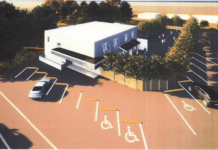What is PPP? Great question. The payroll protection program is a $350 billion slice of the $2.2 trillion CARES Act designed to buoy businesses during the pandemic shutdown. It’s touted for covering payroll costs for eight weeks, and is completely forgivable if employers keep their workers on the payroll.
Where is the PPP money? That’s harder to answer.
Keys Federal Credit Union has handed out 55 PPP loans to the tune of $2 million and its business customers already have the money in their accounts.
But the rollout has been slow for a number of reasons. Not every bank was a Small Business Administration-approved lender when the program was announced, although many have since been given the seal of approval. The entire program was built by banking institutions from the ground up, in a matter of days, with constant updates to the program. Banks also had to acquire the right access to several systems to complete the loan application.
“In defense of all banks participating in PPP, this is an unprecedented situation and no bank was set up to handle it. It simply did not exist just three weeks ago,” said Stephanie Scuderi of Centennial Bank. “That so many institutions have stepped up to at least try is notable and no cause more noble. That said, every bank has their own process – and the reality is that the application volume has grown almost exponentially in the 12 days that the program has been live and it’s been an exercise of extreme resource reallocation throughout the bank to make it happen.”
Centennial Bank said it has received more than 8,000 applications and funded $300 million as of April 14. (Not all the applications are in the Keys; Centennial has institutions in Arkansas, Florida, south Alabama, and New York.) Scuderi said she expects the bank eventually to receive $1 billion in loan requests.
“We started actually putting money in customers’ hands late last week, so the money is definitely flowing and we are confident we have developed a robust and effective process for the Payroll Protection Program,” Scuderi said.
Keys Federal Credit Union CEO Maggie Sayer said her lending institution pushed hard.
“We just made a concerted effort to get the loans into the system. We received our first ‘note’ — or SBA loan agreement — on Friday, April 3, and our first approval on Sunday, April 6,” she said. Sayer said initial PPP guidelines stated the banks had five days to disburse the funds. That has since been extended to 10 days.
“The whole point of the program was to get money in businesses’ hands. As soon as we had authorization and guidance on the note, we moved forward,” Sayer said. “People need money.”
The businesses have 8 weeks to spend the loan and the loan is 100% forgivable if they keep their employees and retain their level of compensation. The loan can be used to cover payroll costs, rent, utilities or interest on any other debt obligations incurred before the pandemic.
Once a business has been approved for a PPP, the local bank issues the federally backed loan. No repayment is required for the first six months of the two-year loan at 1%. Provided the funds have been used for the allowed and approved expenses, the loan will be forgiven, and the local bank is repaid by the federal government. The only outstanding question, Sayer said, is who determines the forgiveness — the local bank or the federal government? — and said she is awaiting more guidelines on this.
U.S. Sen. Marco Rubio of Florida tweeted this week that more than 1 million businesses have applied, and $242 billion in loans have been approved.
Local bankers are urging Keys residents to work directly with Keys institutions for the best results. Quickly.
“Get your application into the financial institution where you have your business account as soon as possible,” Sayer said. “Make sure the application is complete, calculations are correct and supporting payroll documentation is included.”
Scuderi said, “I think the best advice coming out of this disaster, and what we saw with Irma and then again with the government shutdown, the best advice is to plan your savings for these extreme circumstances, and to keep your financials as up to date as possible so you can get to the front of the line for all relief efforts. I also believe that never before has it been so important to have a local bank and a strong relationship characterized by the ability to pick up the phone and speak with your banker.”
First State Bank said the entire industry is strained. Like other banks, it is only working with current customers.
“Many banks, including First State Bank, are only offering this program to current customers as the existing relationship with their primary bank helps to meet some of the verification requirements that might otherwise delay the process,” said Angie Walterson of First State Bank.
Businesses that have submitted their short applications but have not received a loan approval are in a stickier situation. It’s imperative for the customer to verify whether or not the business application has been entered into the E-trans system. If it has, the business is unable to apply with another bank that is moving more quickly. If it hasn’t, the business can apply elsewhere. Again, banks are giving first preference to existing customers.
Will the funding dry up? There’s some concern at the national level that “main street” businesses will be overlooked in favor of “wall street” businesses. According to Monroe County Legislative Liaison Lisa Tennyson, small businesses make up 42% of the state’s workforce. Congress is currently considering another phase to the CARES Act that would allocate more money to the PPP program.
First State Bank’s Karen Sharpe said much of the PPP program is out of the banking industry’s control.
“SBA funding is currently capped and running out, with some estimating the funding to be depleted by the end of the week,” she said. “The program is first come, first served and although there is new government funding proposed, it is still unknown if the parameters and forgiveness features will be the same at this time.”
Bridge Loans
At the same time the federal government was rolling out the PPP, the state of Florida announced it had $50 million in funding for bridge loans. It received 38,000 applications and funded 1,000 loans in 28 days and there is no more funding available.
“The businesses that applied for and were unable to be funded through the Florida Small Business Emergency Bridge Loan program have options,” said Michael W. Myhre of the Florida SBDC network. He said the state government has now shifted its attention to helping unfunded state applicants secure federal disaster resources.
IRS stimulus checks
Locals report seeing the stimulus checks appearing in bank accounts as of April 15. Individuals receive $1,200 each, $2,400 for couples, and $500 per child. There is a sliding scale for top earners beginning at $75,000 per person or $150,000 per couple. Visit irs.gov for more details.


























